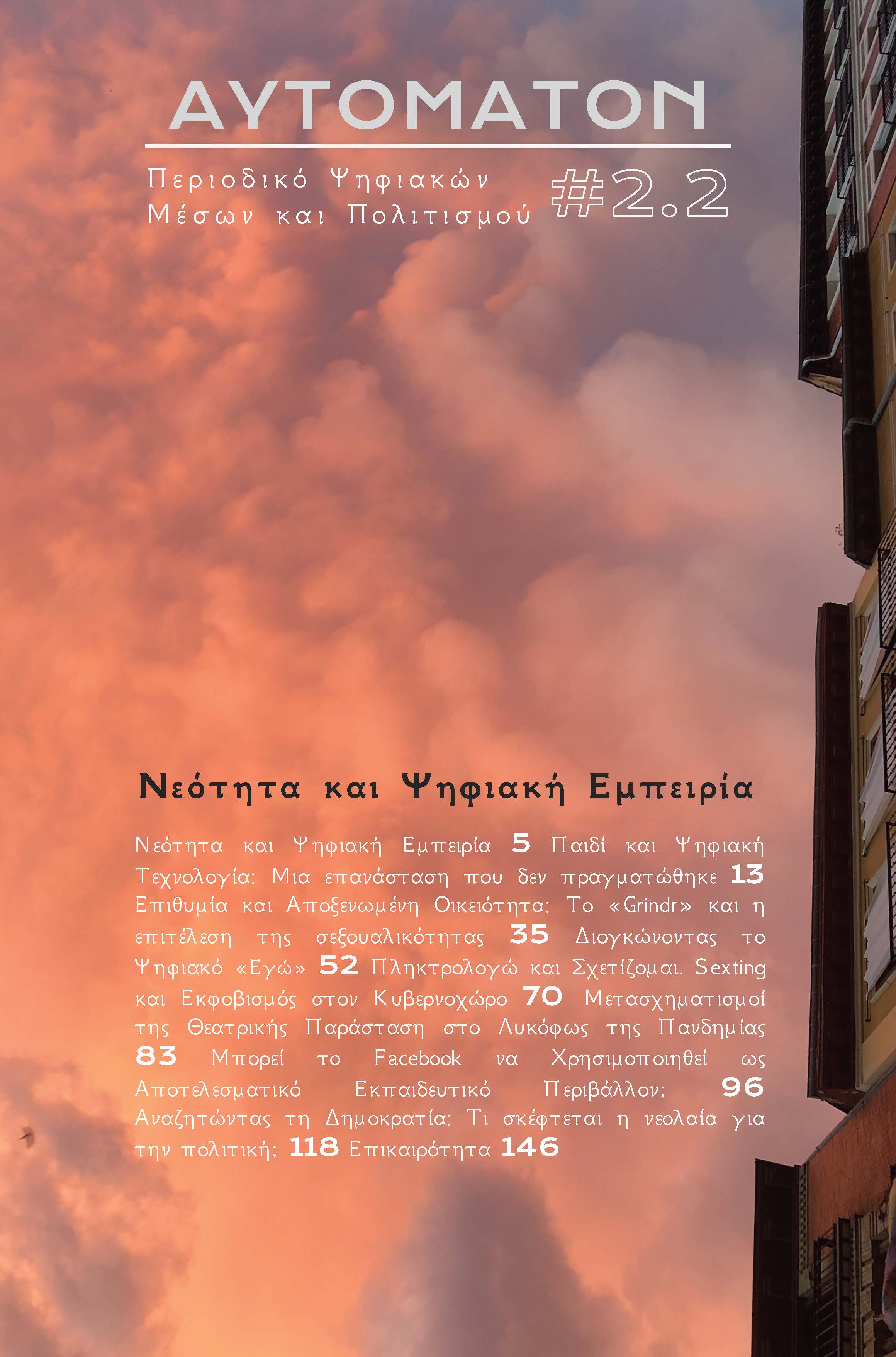Μπορεί το Facebook να χρησιμοποιηθεί ως αποτελεσματικό εκπαιδευτικό περιβάλλον;

Περίληψη
Μετά την αλματώδη ανάπτυξη και χρήση των ψηφιακών μέσων κοινωνικής δικτύωσης καθώς και την εμπλοκή των νέων με αυτά, προέκυψε το ερώτημα εάν μπορούν τα social media, και ειδικότερα το Facebook, να αποτελέσουν για τους μαθητές, εκτός από μέσο επικοινωνίας και ψυχαγωγίας, και ένα αποτελεσματικό εκπαιδευτικό μέσο. Η έρευνα πραγματοποιήθηκε για ένα σχολικό έτος σε δύο σχολεία, με συμμετοχή 100 μαθητών και τεσσάρων εκπαιδευτικών, οι οποίοι χρησιμοποίησαν το Facebook ως εκπαιδευτικό περιβάλλον εντός του οποίου οργάνωσαν και υλοποίησαν τις διδασκαλίες τους. Τα δεδομένα που συλλέχθηκαν προσεγγίστηκαν ποιοτικά και το συμπέρασμα που προέκυψε είναι ότι η πλατφόρμα του Facebook μπορεί υπό προϋποθέσεις, με τον κατάλληλο σχεδιασμό και την αναγκαία διδακτική πλαισίωση, να λειτουργήσει ως αποτελεσματικό εκπαιδευτικό περιβάλλον -να δημιουργήσει δηλαδή μια δυναμική κοινότητα μάθησης, όπου αυξάνεται η γνωστική εμπλοκή των μαθητών, ενισχύεται η συναισθηματική πλευρά της διδασκαλίας και της μάθησης και διαμορφώνονται νέου τύπου ικανότητες για μαθητές και εκπαιδευτικούς.
Λεπτομέρειες άρθρου
- Πώς να δημιουργήσετε Αναφορές
-
Καράκιζα Τ. (2023). Μπορεί το Facebook να χρησιμοποιηθεί ως αποτελεσματικό εκπαιδευτικό περιβάλλον;. Αυτόματον: Περιοδικό Ψηφιακών Μέσων και Πολιτισμού, 2(2), 96–117. https://doi.org/10.12681/automaton.35478
- Ενότητα
- Articles

Αυτή η εργασία είναι αδειοδοτημένη υπό το CC Αναφορά Δημιουργού 4.0.
Οι Συγγραφείς που δημοσιεύουν εργασίες τους σε αυτό το περιοδικό συμφωνούν στους παρακάτω όρους:
1. Οι Συγγραφείς διατηρούν τα Πνευματικά Δικαιώματα και χορηγούν στο περιοδικό το δικαίωμα της πρώτης δημοσίευσης ενώ ταυτόχρονα τα πνευματικά δικαιώματα της εργασίας προστατεύονται σύμφωνα με την Creative Commons Attribution License που επιτρέπει σε τρίτους - αποδέκτες της άδειας να χρησιμοποιούν την εργασία όπως θέλουν με την προϋπόθεση της διατήρησης των διατυπώσεων που προβλέπονται στην άδεια σχετικά με την αναφορά στον αρχικό δημιουργό και την αρχική δημοσίευση σε αυτό το περιοδικό.
2. Οι Συγγραφείς μπορούν να συνάπτουν ξεχωριστές, και πρόσθετες συμβάσεις και συμφωνίες για την μη αποκλειστική διανομή της εργασίας όπως δημοσιεύτηκε στο περιοδικό αυτό (π.χ. κατάθεση σε ένα ακαδημαϊκό καταθετήριο ή δημοσίευση σε ένα βιβλίο), με την προϋπόθεση της αναγνώρισης και την αναφοράς της πρώτης δημοσίευσης σε αυτό το περιοδικό.
3. Το περιοδικό επιτρέπει και ενθαρρύνει τους Συγγραφείς να καταθέτουν τις εργασίες τους μέσω διαδικτύου (π.χ. σε ένα ακαδημαϊκό καταθετήριο ή στους προσωπικές τους ιστοσελίδες) πριν και μετά από τις διαδικασίες της δημοσίευσης, καθώς αυτό μπορεί να οδηγήσει σε παραγωγική ανταλλαγή ιδεών και σκέψεων καθώς επίσης και σε γρηγορότερη και μεγαλύτερη χρήση και ευρετηρίαση της δημοσιευμένης εργασίας (See The Effect of Open Access).


